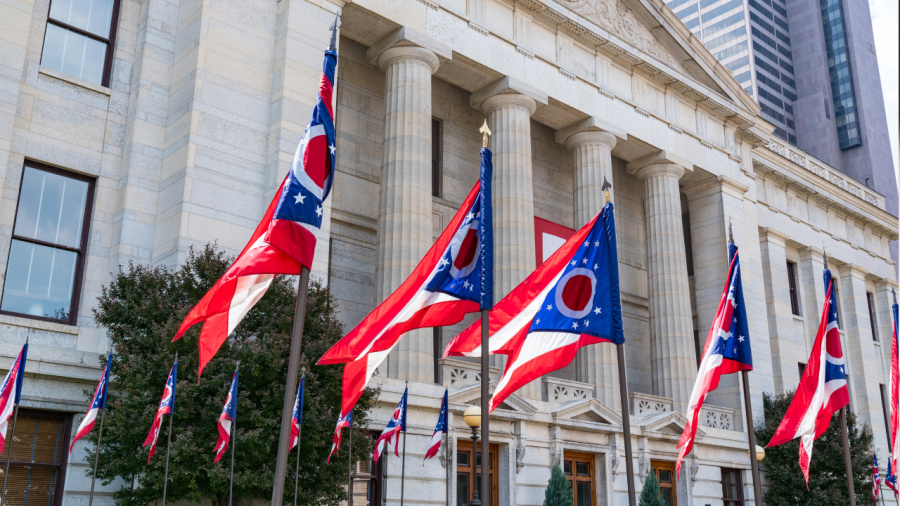COLUMBUS, Ohio (WCMH) — Supporters of a recent Ohio Statehouse bill say that recognizing “Natural Family Month” would highlight the role of married mothers and fathers in raising children, and help reverse what they see as decades of damage to the nuclear family.
House Bill 262, which would designate the weeks between Mother’s Day and Father’s Day as “Natural Family Month,” received a proponent hearing on Sept. 30 in the Ohio House Community Revitalization Committee. Introduced in May by Reps. Josh Williams (R-Sylvania) and Beth Lear (R-Galena), the bill proposes a symbolic recognition of what the legislation calls “natural families”: married heterosexual couples raising biological or adopted children.
“There is only one biological way, one natural way to have a child, and that’s a man and woman laying down and producing an offspring,” Williams said in a NBC4 interview. “We want to make sure that we incentivize, that we encourage them to stay in a family unit and raise a child together.”
Williams described H.B. 262 as part of a broader “family first agenda” from his office that includes legislation focused on promoting marriage, parenting and childbirth.
“We want Ohio to be a place where people want to … get married, plant their roots right here in Ohio, and raise a family with a good career where they can earn an honest living and chase the American dream like I had the opportunity to do so,” he said.
Linda Harvey, president of Mission America and a board member of the Protect Ohio Children coalition, framed the bill as a way to reaffirm societal support for both motherhood and fatherhood, especially as some companies have recently offered customers the option to opt out of Mother’s Day promotions.
“We need to get beyond our own issues and continue to support motherhood and fatherhood and in fact, the mother and father family as well,” Harvey said. “Children thrive when they see committed parents of the opposite sex love each other and support each other. This in turn provides emotional stability and accelerates maturity.”
Harvey cited research that she said shows children raised by married mothers and fathers are less likely to drop out of school or be incarcerated. She also criticized what she called “adult-centered” thinking among those who object to celebrating parental roles.
“The intentional denial of one or the other of a child’s biological parents creates a gap that may never be filled,” she said. “Moms provide identity and emotional capacity, while dads foster social and relational capacity.”
Ryan Folz, a legislative liaison for the Center for Christian Virtue, said the designation would send a “symbolic message” about Ohio’s values. “H.B. 262 is a simple extension of that practice, but it is also one of the most important symbolic acts this body can take,” Folz told the committee.
“Research consistently shows that when families are strong, communities are strong,” he said, citing data from the U.S. Census Bureau and his organization’s work with the Institute for Family Studies. “Across all races, the child poverty rate for children raised by single mothers in our state is 45% … [compared to] only 7% … for children raised by married families.”
Folz also noted that the bill would cost nothing to implement and require no government programs. “It simply affirms that the natural family — children being raised by their biological married mother and father — should be celebrated,” he said.
Marriage counselor Gary Lankford echoed those sentiments, calling the proposal “modest” and “completely uncontroversial.”
“No laws have been proposed. No taxes will be collected. There is no required participation,” Lankford testified. “It is a modest proposal. But it may bring a tremendous benefit to all Ohioans.”
Lankford suggested the designation could inspire community groups to promote stronger marriages. “Perhaps they will support these marriages through the most difficult experiences and challenges of marriage: the differences, the conflicts, the intense emotions, the crushing disappointments, and the unexpected tragedies of life.”
He also responded to critics of the bill, referencing opposition testimony that described H.B. 262 as “cruel” and “anti-LGBTQ+.” “Certainly pro-family individuals and groups will cheer this effort. Who will oppose it? Is anyone really ‘anti-family?'” Lankford said.
Opponents of the bill have argued that it excludes single-parent and LGBTQ+ families and that it aligns with a broader national trend of socially conservative legislation. In May, Equality Ohio executive director Dwayne Steward called the bill “a calculated act of strategic erasure.”
“It not only invalidates the existence of single parents and countless other caregivers, but it takes direct aim at LGBTQ+ families,” Steward said. “The group pushing this legislation has made their ideology clear: if you’re not a heterosexual, monogamous couple with children — led by a biological male from the family lineage — you don’t count as a family at all. As an adoptive parent myself, I feel this erasure personally.”
Asked about those criticisms, Williams said the bill is not meant to exclude any group. “Just because we include one group, doesn’t mean we exclude the other groups,” he said. “When we celebrate Mother’s Day, we don’t discriminate against fathers. When we celebrate Father’s Day, we don’t discriminate against mothers.”
Williams emphasized his belief in promoting what he sees as the best structure for raising children. “We have to offset decades of damage that we did to our family units,” he said. “That is the best family structure, and we’ve seen the studies that show it.”










